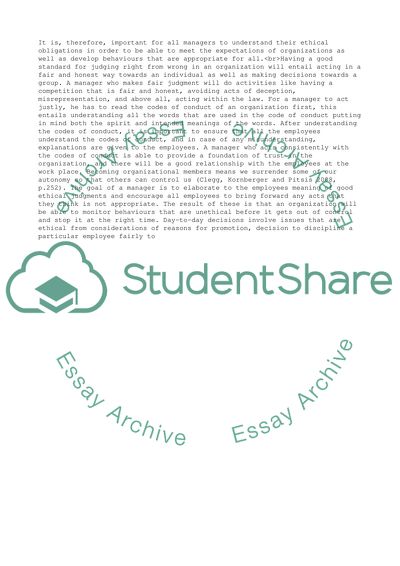Cite this document
(Why should managers of organizations try to make just decisions In Essay, n.d.)
Why should managers of organizations try to make just decisions In Essay. https://studentshare.org/management/1791819-why-should-managers-of-organizations-try-to-make-just-decisions-in-answering-outline-the-benefits-of-organizational-justice-to-management-and-employees-address-how-attention-to-justice-might-influence-decision-making-and-consider-some-of-the-ethical-d
Why should managers of organizations try to make just decisions In Essay. https://studentshare.org/management/1791819-why-should-managers-of-organizations-try-to-make-just-decisions-in-answering-outline-the-benefits-of-organizational-justice-to-management-and-employees-address-how-attention-to-justice-might-influence-decision-making-and-consider-some-of-the-ethical-d
(Why Should Managers of Organizations Try to Make Just Decisions In Essay)
Why Should Managers of Organizations Try to Make Just Decisions In Essay. https://studentshare.org/management/1791819-why-should-managers-of-organizations-try-to-make-just-decisions-in-answering-outline-the-benefits-of-organizational-justice-to-management-and-employees-address-how-attention-to-justice-might-influence-decision-making-and-consider-some-of-the-ethical-d.
Why Should Managers of Organizations Try to Make Just Decisions In Essay. https://studentshare.org/management/1791819-why-should-managers-of-organizations-try-to-make-just-decisions-in-answering-outline-the-benefits-of-organizational-justice-to-management-and-employees-address-how-attention-to-justice-might-influence-decision-making-and-consider-some-of-the-ethical-d.
“Why Should Managers of Organizations Try to Make Just Decisions In Essay”. https://studentshare.org/management/1791819-why-should-managers-of-organizations-try-to-make-just-decisions-in-answering-outline-the-benefits-of-organizational-justice-to-management-and-employees-address-how-attention-to-justice-might-influence-decision-making-and-consider-some-of-the-ethical-d.


